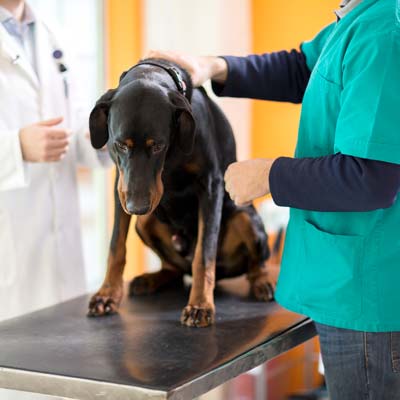Last Updated on July 28, 2022 by Dr. Alisha Barnes

Dogs are one of the most popular pets in the world. They’re loyal, loving, and always happy to see you. But dog can also suffer from back pain, just like humans do. When this happens, it’s time to visit a pet chiropractor. Chiropractors have been helping people and their pets for years with all sorts of health problems, including back pain. So if your dog is suffering, don’t wait any longer – make an appointment today!
Back pain is not uncommon for dog.
It may be tough to tell if our beloved furry companions are feeling healthy and vital or are suffering from any kind of discomfort. Dogs, for example, tend to hide their pain and become distracted easily by the excitement of physical activity, food, or the presence of their favorite humans. As a result, it is critical to be vigilant for indications that your dog is in pain.
Back pain is one of the most prevalent unaddressed challenges in dogs, and it undoubtedly has an impact on their life. Back pain can affect dogs of all ages, and it may manifest as reduced mobility, wincing or whimpering quietly when performing specific activities, and a loss of interest in things they might have previously enjoyed.
It’s commonly thought that a dog’s back pain is irreversible or an unavoidable consequence of age, but this is totally false. Chiropractic therapy may provide the same sort of relief to dogs as it does to people, with the potential for improvement or even total elimination of their pain through expert chiropractic treatment.
What causes back pain in dogs?
Back pain in dog is caused for a variety of reasons. It may be due to frequent jumping on and off surfaces such as beds, sofas, and chairs in small dogs. As the joints and bones attempt to compensate for these extreme movements, they can be forced out of alignment by repeated impact, resulting in tension, pinched nerves, inflammation, and even ligament and muscle damage.
When jumping on and off surfaces, the same effects of landing impact can occur for both medium or big dogs. Furthermore, medium and huge dogs are more prone to genetic or breed-related bone and joint misalignment than little ones, which may aggravate any activities that they already participate in. Genetic and breed-related propensities for malalignment may also get worse with time as a result of their own.
If you’ve ever seen your dog fall, jump, or land roughly on or off of a surface—even if they didn’t appear to be hurt—these events may have caused an injury or the start of misalignment, which can get worse if left untreated. When the body attempts to compensate for a deficient area by putting strain on many of the other mobility, structure, muscle, and joint mechanisms in the body, this puts pressure on them all.
Signs of Pain
Sudden inexplicable weakness, as shown by your dog’s inability to execute particular physical activities or a lack of enthusiasm to play as they usually would, is one of the signals that they are in pain.
If your dog is experiencing discomfort, chiropractic therapy may be the answer you’re looking for. While a conventional veterinarian may treat your dog’s discomfort with a topical or injected solution such as cortisone, or even give pain medication to make his or her suffering more bearable, a pet chiropractor cures pain at the source.
The Power of Pet Chiropractic
Your dog’s chiropractor will first examine his spine and posture using a visual exam that measures posture, gait, and stance. This enables your veterinarian to identify what is causing your pet’s suffering and discomfort as well as recommend appropriate therapy.
A chiropractor may also request a verbal history of your dog’s health background, as well as a statement of any signs you’ve observed indicating discomfort and when they appear. Finally, your expert chiropractor will intuitively draw on their vast experience and expertise to determine the ideal therapy for your pet.
Your dog may benefit from chiropractic care in the same way you would. Chiropractic adjustments can alleviate inflamed and constricted nerves, as well as flexibility and mobility that have been lost previously. A reduction in muscular strain and tension is another benefit of chiropractic treatment for dogs.
All that is usually required to assist your beloved pet’s spine return to normal balance and improve their quality of life is attention to the source of their discomfort, not the visible signs.
Booking Your Appointment
By visiting a pet chiropractor, you are choosing to assist your dog get long-term relief by targeting the source of their suffering.
Dr. Alisha Barnes of Tails Animal Chiropractic Care in the Boulder/Fort Collins region has helped countless dogs recover and heal from chronic back pain and discomfort. If you’re ready to start your dog’s journey back to optimal health and wellbeing, book an appointment today.
